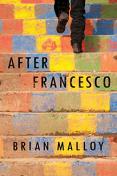
by Brian Malloy
Hardcover- $21.99
Click on the ORANGE Amazon Button for Book Description & Pricing Info
Overall rating:
How would you rate this book?
Member ratings
After Francesco, Brian Malloy, author; Michael Crouch, narrator
The book covers a time that will forever be a stain on America’s history because of its handling of a population of sick and dying young men and women whose illness did not garner the attention of anyone important until "supposedly innocent victims became infected via blood transfusions or through medical accidents”. It was a shameful time for America, and it took too long for Americans to recognize the suffering of those afflicted.
The novel is about Kevin Doyle, a young, confused and ostracized gay man who falls in love with Frankie. Frankie falls ill with Aids and dies. The ramifications of his illness on those who surrounded him were profound. There was no emotional support and even less medical help. The prevailing atmosphere was one of guilt and shame.
Having lived through the terrible times when the Aids epidemic began, and was largely ignored by a population that rejected the LGBTQ world, I was eager to read Brian Malloy’s novel. I was interested in discovering the way someone who lived through it as a gay man, with the lack of resources and attention it should have received from the get-go, was able to deal with it. The book is at once, captivating and emotionally engaging. Malloy authentically described the era, the suffering and the lack of attention paid to those who suffered so abysmally. He accurately described the despair and the terrible fear of being tested for Aids and discovering the results. It was a death sentence, at first, and then, when a drug protocol was developed, insurance companies balked at supplying the treatment and many of the young men had no insurance at all. There seemed to be no way out at first, but then famous people succumbed, and it garnered greater attention and concern, demanding realistic responses to the tragic situation unfolding.
I do know that, earlier, in the mid-sixties, the common image being promoted was that homosexuals were dishonest and would take advantage of any situation. It was not my experience then or in the 80’s. In the mid-sixties, coincidentally, I lived next door to two gay men, Big Eddie and Little Eddie. I was newly married, and they became my new best friends. During the blackout in the Northeast, they protected me. New Year’s Eve they invited us to their party. We were the only straight couple. Big Eddie had a picture of a beautiful woman in a gown, and I asked if it was his sister; he said it was him. He promised me that gown, but I never received it. They never said they were in any trouble, but one day, without any warning, a notice on their door announced their eviction. I was surprised they did not tell me how to reach them, or ask for help, and was disappointed to see our friendship end so suddenly.
Because of the detailed descriptions of love-making, which I do not believe enhanced but rather distracted from the book, I think the book may appeal to a largely gay audience, which is sad, since the neglect they experienced should never be repeated for any group of people, and yet we saw the elderly mishandled by New York’s Governor Cuomo during this most recent Pandemic. I urge the reader to continue even when the subject is difficult, because the story of the terrible times is excellent, even with the prurient sex and profane language. We should never forget how to care for each other. It also bothered me that sometimes the gay men were depicted stereotypically, as emotionally immature and irresponsible, as somehow defective. None of my friends or associates, people in the workplace or who worked for me, were anything like that.
I believe that the author’s political views were unnecessary and incorrect. The Aids epidemic took place largely during the 80’s and 90’s, under Carter, Reagan, and Clinton, so bashing Bush and Trump was unnecessary. I am a Republican and I was alone in supporting the afflicted. My liberal friends pretended they did not exist and ostracized me when I went to visit a friend who was dying, in fear of my being contagious. So much for the Democrats. In a book with such an important message, hypocritical political views have no place.
Book Club HQ to over 90,000+ book clubs and ready to welcome yours.
Get free weekly updates on top club picks, book giveaways, author events and more








